Last Updated: Nov 22, 2022
Quick Links: Table of Contents
- Are Great Pyreneess Aggressive Towards Strangers?
- Are Great Pyreneess Aggressive Towards their Owners?
- Are Great Pyreneess Aggressive Towards other Dogs?
- Are Great Pyreneess Afraid of Strangers?
- Are Great Pyreneess Afraid of Other Dogs?
- Do Great Pyreneess Have Non-Social Fears?
- Do Great Pyreneess Get Along Well With Other Dogs?
- Are Great Pyreneess Easy to Train?
- Do Great Pyreneess Get Along Well with Cats? Do They Get Along Well with Other Pets?
- Do Great Pyreneess Like Attention? Are they Clingy or Aloof?
- Do Great Pyreneess have Separation Anxiety? Do They Like to be Left Alone?
- Are Great Pyreneess Touch Sensitive? Do They Like to be Groomed?
- Are Great Pyreneess Hyper? Are they Highly Excitable?
- Are Great Pyreneess Playful? What is the Energy Level of Great Pyreneess
- Conclusion on Great Pyrenees Temperament
Introduction to the Temperament of the Great Pyrenees
The are many descriptions of the temperament of the Great Pyrenees out there. However, most of these descriptions are difficult to verify or prove. They are based on mere speculations.
In this article, we will provide a factual description of the temperament of the Great Pyrenees based on solid scientific research. This will give you a better understanding of what you can expect from the Great Pyrenees breed.
We obtained our description of the temperament of Great Pyrenees by analyzing raw scientific data from The Canine Behavioral Assessment & Research Questionnaire (C-BARQ) database.
The C-BARQ dog temperament standard was developed by researchers from the University of Pennsylvania. It is considered the gold standard for measuring the behavior of dogs.
Over the years, the C-BARQ study has collected data on the temperament of thousands of dogs of different breeds including the Great Pyrenees.
The C-BARQ study obtains its data by asking dog owners to score the behavior of their dogs on different behavior patterns.
The idea behind the C-BARQ study is that if it collects thousands of scores from thousands of dog owners on different aspects of dog behavior, a clear pattern will emerge on the temperament of different dog breeds.
The C-BARQ questionnaire measures 14 behavior aspects of dogs:
- Aggression towards stranger
- Aggression towards its owner
- Aggression towards other dogs
- How well they get along with other dogs
- Fear of strangers
- Fear of new things (new objects, unfamiliar loud sounds, etc)
- Fear of other dogs
- Separation anxiety
- Clinginess
- Trainability/ Stubbornness
- Prey drive
- Excitability
- Touch sensitivity
- Energy level
In this article, we will discuss the score of the Great Pyrenees for each of these 14 characteristics. This will let you know the real temperament of the Great Pyrenees.
The summary table below shows the score of the Great Pyrenees for the different behavioral characteristics.
High percentage scores close to 100 are bad. Low percentage scores close to 0 are good.
| Behavior | Score |
|---|---|
| Excitability | 6.2 percent |
| Separation Related Behavior | 53.0 percent |
| Stubbornness | 49.8 percent |
| Stranger Directed Aggression | 36.0 percent |
| Dog Rivalry | 34.0 percent |
| Stranger Directed Fear | 32.5 percent |
| Nonsocial Fear | 29.7 percent |
| Dog Directed Aggression | 28.8 percent |
| Attachment Attention Seeking | 21.6 percent |
| Touch Sensitivity | 20.2 percent |
| Energy Level | 17.1 percent |
| Dog Directed Fear | 16.8 percent |
| Prey Drive | 14.3 percent |
| Owner Directed Aggression | 12.4 percent |
Note that with proper training, you can better your Great Pyrenees`s temperament. To learn how to properly train your Great Pyrenees, I highly recommend that you go through Dr. Ian Dunbar`s online dog training classes, which you can find here.
I learned most of the things that I know about training dogs by reading Dr. Dunbar`s books and watching his training videos. Dr. Dunbar`s dog training methods are for people expecting to own a puppy soon, new dog owners, and experienced dog owners.
Another helpful online dog training class that I recommend is this one. The class will teach you how to properly train your Great Pyrenees.
See also our complete ranking of dog breeds from the `best` to the `worst` based on temperament.
Are Great Pyreneess Aggressive Towards Strangers?
Dog breeds that are aggressive to strangers show hostile responses to strangers approaching or invading the dog`s or the dog owner`s personal space, territory, or home range.
Stranger-aggressive dog breeds are quick to show aggression to unfamiliar people.
Typical signs of moderate aggression in dogs include barking, growling, and baring of teeth. More serious display of aggression generally includes snapping, lunging, biting, or attempting to bite.
Great Pyreneess are somewhat aggressive towards strangers.
This is because the Great Pyrenees ranks average for aggression towards strangers.
The Great Pyrenees ranks number 52 out of 124 dog breeds for aggression towards strangers.
This information is based on what 32 Great Pyrenees owners reported on the temperament of their Great Pyrenees in a research survey.
Based on our further analysis of the survey, we found that the Great Pyrenees has a stranger-directed-aggression score of 36.0 %.
Other dog breeds that are somewhat aggressive towards strangers just like the Great Pyrenees are listed in the table below
| Stranger-Directed-Aggression Rank | Breed | Stranger-Directed-Aggression Score |
|---|---|---|
| 49 | Afghan Hound | 36.5 % |
| 50 | Bull Terrier | 36.5 % |
| 51 | American Bulldog | 36.3 % |
| 52 | Great Pyrenees | 36.0 % |
| 53 | Border Collie | 35.2 % |
| 54 | Great Dane | 34.8 % |
| 55 | Akita | 33.6 % |
The dog breeds that are most aggressive towards strangers are the:
The dog breeds that are least aggressive towards strangers are the:
Usually, small dog breeds display aggression not because they are mean but because they are afraid and feel insecure due to their small size.
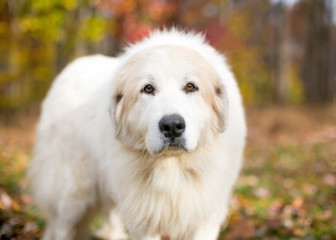
Are Great Pyreneess Aggressive Towards their Owners?
Due to human effort over the course of many centuries, the dog has become a very domestic animal. Dogs have learned to live well with humans. As a result, dogs respect and love their owners. Nevertheless, some dog breeds are less respectful to their owners than some other dog breeds.
Owner-aggressive dog breeds show threatening or hostile responses to their owner or other members of the household when challenged, manhandled, stared at, stepped over, or when approached while in possession of food, objects, or toys.
A dog that is owner-aggressive shows its aggression by barking, growling, and baring of teeth. In extreme cases, these dogs can snap, lunge, bite, or attempt to bite their owners.
Great Pyreneess are somewhat aggressive towards their owners.
This is because the Great Pyrenees ranks average for aggression towards its owner.
The Great Pyrenees ranks number 72 out of 124 dog breeds for aggression towards their owners.
This information is based on what 32 Great Pyrenees owners reported on the temperament of their Great Pyrenees in a research survey.
Based on our further analysis of the survey, we found that the Great Pyrenees has an owner-directed-aggression score of 12.4 %.
Other dog breeds that are somewhat owner-aggressive just like the Great Pyrenees are listed in the table below
| Owner-Directed-Aggression Rank | Breed | Owner-Directed-Aggression Score |
|---|---|---|
| 69 | Flat-Coated Retriever | 13.1 % |
| 70 | West Highland White Terrier | 13.1 % |
| 71 | Belgian Malinois | 12.7 % |
| 72 | Great Pyrenees | 12.4 % |
| 73 | Redbone Coonhound | 11.9 % |
| 74 | Fox Terrier (Smooth) | 11.9 % |
| 75 | Norwegian Elkhound | 11.8 % |
The dog breeds that show the most aggression towards their owners are the:
The dog breeds that are least aggressive towards their owners are the:
Usually, small dog breeds display aggression not because they are mean but because they are afraid and feel insecure due to their small size.
Are Great Pyreneess Aggressive Towards other Dogs?
Dogs that are aggressive towards other dogs will direct aggressive threats or actions toward unknown or unfamiliar dogs.
A dog-aggressive dog will threaten or show hostile responses when approached by unfamiliar dogs
A dog that is dog-aggressive shows its aggression by barking, growling, and baring of teeth. In extreme cases, these dogs can snap, lunge, bite, or attempt to bite other dogs.
Great Pyreneess are a little bit aggressive towards other dogs.
This is because the Great Pyrenees ranks low for aggression towards other dogs.
The Great Pyrenees ranks number 96 out of 124 dog breeds for aggression towards other dogs.
This information is based on what 32 Great Pyrenees owners reported on the temperament of their Great Pyrenees in a research survey.
Based on our further analysis of the survey, we found that the Great Pyrenees has a dog-directed aggression score of 28.8 %.
Other dog breeds that are a little bit dog-aggressive just like the Great Pyrenees are listed in the table below
| Dog-Directed-Aggression Rank | Breed | Dog-Directed-Aggression Score |
|---|---|---|
| 93 | Scottish Terrier | 29.3 % |
| 94 | Portuguese Water Dog | 29.2 % |
| 95 | Shih Tzu | 28.9 % |
| 96 | Great Pyrenees | 28.8 % |
| 97 | Havanese | 28.5 % |
| 98 | Bichon Frise | 28.1 % |
| 99 | Dingo | 27.7 % |
The dog breeds that show the most aggression towards other dogs are the:
The dog breeds that are least aggressive towards other dogs are the:
Usually, small dog breeds display aggression not because they are mean but because they are afraid and feel insecure due to their small size.
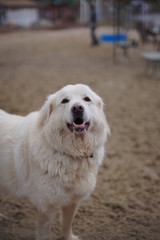
Are Great Pyreneess Afraid of Strangers?
Some dogs breeds tend to be fearful of strangers.
Dogs that are fearful of strangers will avoid strangers. These dogs will crouch, cringe, or tremble when approached by strangers.
Extreme fear in dogs is characterized by serious attempts to escape or hide from the feared stranger.
Great Pyreneess are somewhat fearful of strangers.
This is because the Great Pyrenees ranks average for fear of strangers.
The Great Pyrenees ranks number 52 out of 124 dog breeds for fear of strangers.
This information is based on what 32 Great Pyrenees owners reported on the temperament of their Great Pyrenees in a research survey.
Based on our further analysis of the survey, we found that the Great Pyrenees has a stranger-directed-fear score of 32.5 %.
Other dog breeds that are somewhat stranger-fearful just like the Great Pyrenees are listed in the table below
| Stranger-Directed-Fear Rank | Breed | Stranger-Directed-Fear Score |
|---|---|---|
| 49 | Havanese | 33.7 % |
| 50 | Poodle (Miniature) | 33.4 % |
| 51 | Tibetan Terrier | 32.6 % |
| 52 | Great Pyrenees | 32.5 % |
| 53 | Cairn Terrier | 32.2 % |
| 54 | Pit Bull mix | 31.5 % |
| 55 | Belgian Malinois | 31.0 % |
The dog breeds that show the most fear of strangers are the:
The dog breeds that are least fearful of strangers are the:
Are Great Pyreneess Afraid of Other Dogs?
Some dogs breeds tend to show fear when an unfamiliar dog approaches them.
A dog that is fearful of other dogs will try to avoid meeting other dogs.
Great Pyreneess are not fearful of other dogs.
This is because the Great Pyrenees ranks very low for fear of other dogs.
The Great Pyrenees ranks number 107 out of 124 dog breeds for fear of other dogs.
This information is based on what 32 Great Pyrenees owners reported on the temperament of their Great Pyrenees in a research survey.
Based on our further analysis of the survey, we found that the Great Pyrenees has a dog-directed-fear score of 16.8 %.
Other dog breeds that are not other-dog-fearful just like the Great Pyrenees are listed in the table below
| Dog-Directed-Fear Rank | Breed | Dog-Directed-Fear Score |
|---|---|---|
| 104 | Scottish Terrier | 19.7 % |
| 105 | Irish Wolfhound | 17.6 % |
| 106 | German Wirehaired Pointer | 17.5 % |
| 107 | Great Pyrenees | 16.8 % |
| 108 | Gordon Setter | 16.6 % |
| 109 | Bullmastiff | 16.5 % |
| 110 | Irish Setter | 16.4 % |
The dog breeds that are most fearful of other dogs are the:
The dog breeds that are least fearful of other dogs are the:
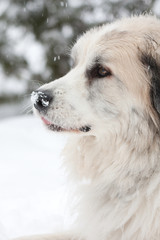
Do Great Pyreneess Have Non-Social Fears?
Dogs that are fearful of sudden or loud noises, traffic, and unfamiliar objects and situations are said to exhibit nonsocial fear.
Great Pyreneess are somewhat fearful of unfamiliar sounds, situations, and objects.
This is because the Great Pyrenees ranks average for non-social fear.
The Great Pyrenees ranks number 67 out of 124 dog breeds for being fearful of unfamiliar things and situations.
This information is based on what 32 Great Pyrenees owners reported on the temperament of their Great Pyrenees in a research survey.
Based on our further analysis of the survey, we found that the Great Pyrenees has a nonsocial-fear score of 29.7 %.
Other dog breeds that are somewhat nonsocial-fearful just like the Great Pyrenees are listed in the table below
| Nonsocial-Fear Rank | Breed | Nonsocial-Fear Score |
|---|---|---|
| 64 | Dalmatian | 31.3 % |
| 65 | Afghan Hound | 30.9 % |
| 66 | Cocker Spaniel (American) | 30.6 % |
| 67 | Great Pyrenees | 29.7 % |
| 68 | Whippet | 29.6 % |
| 69 | Great Dane | 28.4 % |
| 70 | Bulldog | 27.2 % |
The dog breeds that are most fearful of unfamiliar situations and objects are the:
The dog breeds that are least fearful of unfamiliar situations and objects are the:
Do Great Pyreneess Get Along Well With Other Dogs?
Some dog breeds display high dog rivalry. These dog breeds will threaten or act hostile to other familiar dogs in the same household.
These dog breeds will compete with other dogs. Also, these dog breeds do not get along well with other dogs.
Great Pyreneess are a little bit competitive when dealing with other dogs.
This is because the Great Pyrenees ranks low on dog rivalry.
The Great Pyrenees ranks number 74 out of 124 dog breeds for displaying dog rivalry when dealing with familiar dogs.
This information is based on what 32 Great Pyrenees owners reported on the temperament of their Great Pyrenees in a research survey.
Based on our further analysis of the survey, we found that the Great Pyrenees has a dog-rivalry score of 34.0 %.
Other dog breeds that are a little bit competition-driven just like the Great Pyrenees are listed in the table below
| Dog-Rivalry Rank | Breed | Dog-Rivalry Score |
|---|---|---|
| 71 | Belgian Sheepdog | 34.2 % |
| 72 | Siberian Husky | 34.2 % |
| 73 | English Setter | 34.1 % |
| 74 | Great Pyrenees | 34.0 % |
| 75 | Airedale Terrier | 33.7 % |
| 76 | Chow Chow | 33.4 % |
| 77 | Belgian Tervuren | 33.3 % |
The dog breeds that do not get along well with other dogs are the:
The dog breeds that get along well with other dogs are the:
See our complete ranking of dog breeds based on how well they get along with other dog breeds.
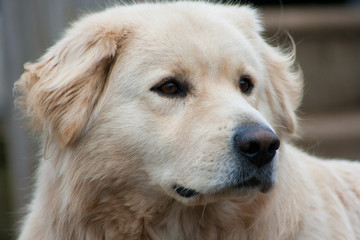
Are Great Pyreneess Easy to Train?
Dogs have high trainability have the willingness to listen to their owner. These dogs are not stubborn. These dogs obey simple commands, and they learn very quickly.
Highly trainable dogs excel at fetching objects. They also respond positively to correction and ignore distraction.
Great Pyreneess are not easy to train.
This is because the Great Pyrenees ranks very low for trainability.
The Great Pyrenees ranks number 100 out of 124 dog breeds for easiness to train.
This information is based on what 32 Great Pyrenees owners reported on the trainability of their Great Pyrenees in a research survey.
Based on our further analysis of the survey, we found that the Great Pyrenees has a trainability score of 50.2 %.
Other dog breeds that are not easy to train just like the Great Pyrenees are listed in the table below
| Trainability Rank | Breed | Trainability Score |
|---|---|---|
| 97 | Old English Sheepdog | 52.5 % |
| 98 | American Eskimo Dog | 52.3 % |
| 99 | Shiba Inu | 52.1 % |
| 100 | Great Pyrenees | 50.2 % |
| 101 | Fox Terrier (Smooth) | 50.0 % |
| 102 | Black and Tan Coonhound | 48.6 % |
| 103 | Lhasa Apso | 47.8 % |
The dog breeds that are most easy to train are the:
The dog breeds that are difficult to train are the:
Learn more about how intelligent the Great Pyrenees is and how the intelligence of the Great Pyrenees affects its trainability in this article on how smart the Great Pyrenees is.
Do Great Pyreneess Get Along Well with Cats? Do They Get Along Well with Other Pets?
Dog breeds that have high chase-drive will run after (chase) cats, birds, and/or other small animals, given the opportunity.
Great Pyreneess are not into chasing after other smaller pets like cats, squirrels, chickens, and birds.
This is because the Great Pyrenees ranks very low for small-pet-chasing.
The Great Pyrenees ranks number 120 out of 124 dog breeds for chasing after smaller pets.
This information is based on what 32 Great Pyrenees owners reported on the temperament of their Great Pyrenees in a research survey.
Based on our further analysis of the survey, we found that the Great Pyrenees has a chasing score of 14.3 %.
Other dog breeds that are not into chasing after smaller pets just like the Great Pyrenees are listed in the table below
| Chasing Rank | Breed | Chasing Score |
|---|---|---|
| 117 | Black and Tan Coonhound | 19.2 % |
| 118 | Keeshond | 18.5 % |
| 119 | Mastiff (English) | 18.2 % |
| 120 | Great Pyrenees | 14.3 % |
| 121 | Bernese Mountain Dog | 11.3 % |
| 122 | Shih Tzu | 10.7 % |
| 123 | Bulldog | 7.5 % |
The dog breeds that like chasing after cats and other smaller pets are the:
The dog breeds that will not chase after cats and other smaller pets are the:
See our complete ranking of dog breeds based on their prey drive.
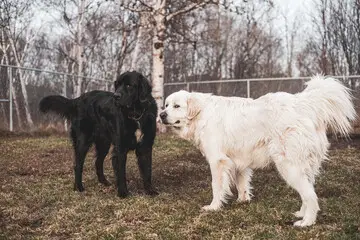
Do Great Pyreneess Like Attention? Are they Clingy or Aloof?
Some dog breeds like to stay close to their owners all the time. These dogs like attention, and they like to receive the affection of their owners.
These dogs get jealous when their owners give attention to other dogs or other people instead of them.
Dogs with these traits are described as attachment/attention-seeking.
Great Pyreneess are not attachment/attention-seeking.
This is because the Great Pyrenees ranks very low for attachment/attention-seeking behavior.
The Great Pyrenees ranks number 112 out of 124 dog breeds for attachment/attention-seeking behavior.
This information is based on what 32 Great Pyrenees owners reported on the temperament of their Great Pyrenees in a research survey.
Based on our further analysis of the survey, we found that the Great Pyrenees has an attachment/attention-seeking score of 21.6 %.
Other dog breeds that are not attachment/attention-seeking just like the Great Pyrenees are listed in the table below
| Attachment-Attention-Seeking Rank | Breed | Attachment-Attention-Seeking Score |
|---|---|---|
| 109 | Nova Scotia Duck Tolling Retriever | 26.2 % |
| 110 | Samoyed | 24.7 % |
| 111 | Bull Terrier | 23.3 % |
| 112 | Great Pyrenees | 21.6 % |
| 113 | Irish Wolfhound | 21.1 % |
| 114 | Cairn Terrier | 21.0 % |
| 115 | Greyhound | 19.8 % |
The dog breeds that are always seeking the attention of their owners are the:
The dog breeds that are aloof are the:
See our complete ranking of dog breeds based on their clinginess.
Do Great Pyreneess have Separation Anxiety? Do They Like to be Left Alone?
Dog breeds that have separation anxiety do not like to be left alone.
These dog breeds tend to bark and destroy things when separated from their owners.
They become restless or lose their appetite when left alone.
Great Pyreneess are quite a bit prone to developing separation anxiety.
This is because the Great Pyrenees ranks high for separation anxiety relative to other dog breeds.
The Great Pyrenees ranks number 27 out of 124 dog breeds for separation anxiety.
This information is based on what 32 Great Pyrenees owners reported on the temperament of their Great Pyrenees in a research survey.
Based on our further analysis of the survey, we found that the Great Pyrenees has a separation anxiety score of 53.0 %.
Other dog breeds that are quite a bit prone to develop separation anxiety just like the Great Pyrenees are listed in the table below
| Separation-Related-Behavior Rank | Breed | Separation-Related-Behavior Score |
|---|---|---|
| 24 | Redbone Coonhound | 54.1 % |
| 25 | Fox Terrier (Wire/Wire-haired) | 54.0 % |
| 26 | Parson Russell Terrier | 53.1 % |
| 27 | Great Pyrenees | 53.0 % |
| 28 | Cardigan Welsh Corgi | 53.0 % |
| 29 | Pit Bull mix | 52.3 % |
| 30 | German Shorthaired Pointer | 51.7 % |
The dog breeds that are most prone to develop separation anxiety are listed below. These dog breeds do not like to be left alone. These dog breeds are the:
- Treeing Walker Coonhound
- Fox Terrier (Smooth)
- Chinese Crested
- Miniature Pinscher
- Australian Silky Terrier
The dog breeds that are least prone to develop separation anxiety are the:
See our complete ranking of dog breeds based on their tendency to develop separation anxiety.
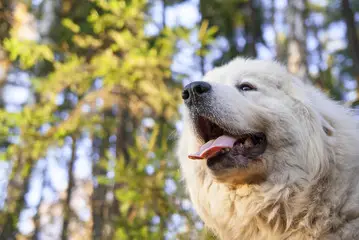
Are Great Pyreneess Touch Sensitive? Do They Like to be Groomed?
Dogs that are touch-sensitive are fearful of `painful` procedures such as bathing, grooming, nail clipping, and veterinary examinations.
These dogs do not like going through these `painful` procedures, and they will react to show they do not like the procedure.
Great Pyreneess are a little bit touch-sensitive.
This is because the Great Pyrenees ranks low for touch sensitivity.
The Great Pyrenees ranks number 96 out of 124 dog breeds for touch sensitivity.
This information is based on what 32 Great Pyrenees owners reported on the temperament of their Great Pyrenees in a research survey.
Based on our further analysis of the survey, we found that the Great Pyrenees has a touch-sensitivity score of 20.2 %.
Other dog breeds that are a little bit touch-sensitive just like the Great Pyrenees are listed in the table below
| Touch-Sensitivity Rank | Breed | Touch-Sensitivity Score |
|---|---|---|
| 93 | Bulldog | 21.4 % |
| 94 | Siberian Husky | 21.3 % |
| 95 | Soft Coated Wheaten Terrier | 20.5 % |
| 96 | Great Pyrenees | 20.2 % |
| 97 | Giant Schnauzer | 20.2 % |
| 98 | Vizsla | 19.9 % |
| 99 | Doberman Pinscher | 19.4 % |
The dog breeds that are most touch-sensitive are the:
The dog breeds that are least touch-sensitive are the:
See our complete ranking of dog breeds based on their sensitivity to touch.
Are Great Pyreneess Hyper? Are they Highly Excitable?
Excitable dog or hyper dog breeds display strong reactions to potentially exciting or arousing events, such as:
- going for walks
- car trips
- sound of the doorbell
- arrival of visitors, and
- the owner arriving home
Highly excitable dog breeds have difficulty settling down after arousal.
Great Pyreneess are not hyper (excitable).
This is because the Great Pyrenees ranks very low for excitability.
The Great Pyrenees ranks number 122 out of 124 dog breeds for excitability.
This information is based on what 32 Great Pyrenees owners reported on the temperament of their Great Pyrenees in a research survey.
Based on our further analysis of the survey, we found that the Great Pyrenees has an excitability score of 6.2 %.
Other dog breeds that are not excitable just like the Great Pyrenees are listed in the table below
| Excitability Rank | Breed | Excitability Score |
|---|---|---|
| 119 | Collie | 14.0 % |
| 120 | Anatolian Shepherd | 11.7 % |
| 121 | Italian Greyhound | 9.1 % |
| 122 | Great Pyrenees | 6.2 % |
| 123 | Samoyed | 5.9 % |
| 124 | Borzoi | 0.0 % |
The dog breeds that are most hyper (excitable) are the:
- Australian Silky Terrier
- Fox Terrier (Smooth)
- American Eskimo Dog
- Parson Russell Terrier
- Miniature Schnauzer
The dog breeds that are least hyper (excitable) are the:
See our complete ranking of dog breeds based on how hyper they are.
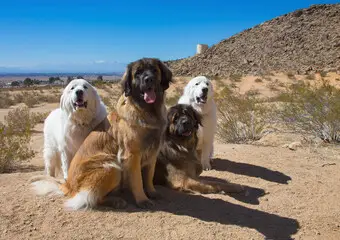
Are Great Pyreneess Playful? What is the Energy Level of Great Pyreneess
Energetic dog breeds are very playful dog breeds. These are the dog breeds that do not get tired easily.
Great Pyreneess are not energetic.
This is because the Great Pyrenees ranks very low for energy level.
The Great Pyrenees ranks number 121 out of 124 dog breeds for energy level.
This information is based on what 32 Great Pyrenees owners reported on the temperament of their Great Pyrenees in a research survey.
Based on our further analysis of the survey, we found that the Great Pyrenees has an energy-level score of 17.1 %.
Other dog breeds that are not energetic just like the Great Pyrenees are listed in the table below
| Energy-Level Rank | Breed | Energy-Level Score |
|---|---|---|
| 118 | Eurasier | 23.1 % |
| 119 | Black and Tan Coonhound | 19.7 % |
| 120 | Pekingese | 18.2 % |
| 121 | Great Pyrenees | 17.1 % |
| 122 | Greyhound | 11.7 % |
| 123 | Anatolian Shepherd | 9.4 % |
| 124 | Kuvasz | 0.0 % |
The dog breeds that are most playful and most energetic are the:
The dog breeds that are laziest are the:
See our complete ranking of dog breeds from the most energetic to the least energetic.
Conclusion on Great Pyrenees Temperament
The temperament of your Great Pyrenees comes from a combination of its genetics and what environment your Great Pyrenees is exposed to.
You cannot change your Great Pyrenees`s gene but you can change the things you expose your Great Pyrenees to.
Exposing your Great Pyrenees to dog training sessions early in its life can help you mold the temperament of your Great Pyrenees to what you desire.
Again, with proper training, you can better your Great Pyrenees`s temperament. To learn how to properly train a dog, I highly recommend Dr. Ian Dunbar`s online dog training classes, which you can find here.
I learned most of the things I know about training dogs by reading Dr. Dunbar`s books and watching his training videos. Dr. Dunbar`s dog training methods are for people expecting to own a puppy soon, new dog owners, and experienced dog owners.
Another helpful online dog training class that I recommend is this one. The class will teach you how to properly train your Great Pyrenees.
If you think the Great Pyrenees is the right dog breed for you, see our article on how much Great Pyreneess cost and Great Pyrenees puppy buying guide.
Also, see our list of reputable Great Pyrenees breeders in the United States and the prices of their Great Pyrenees puppies.
